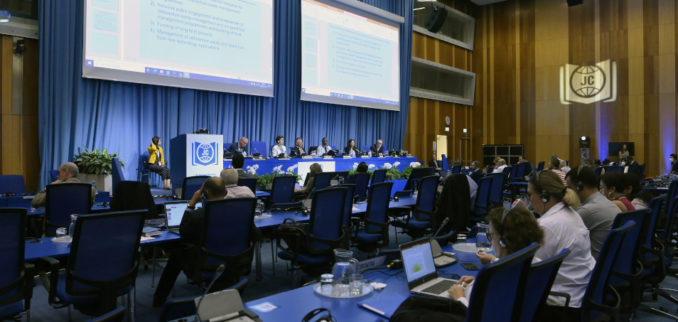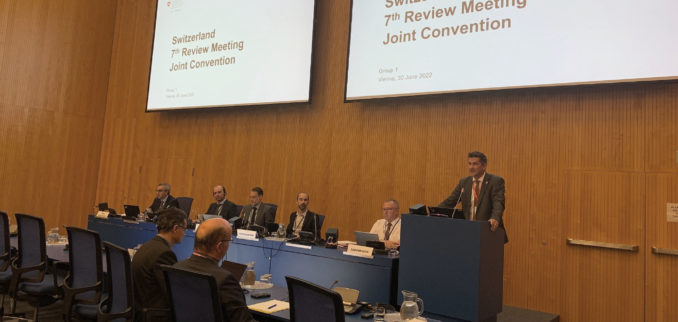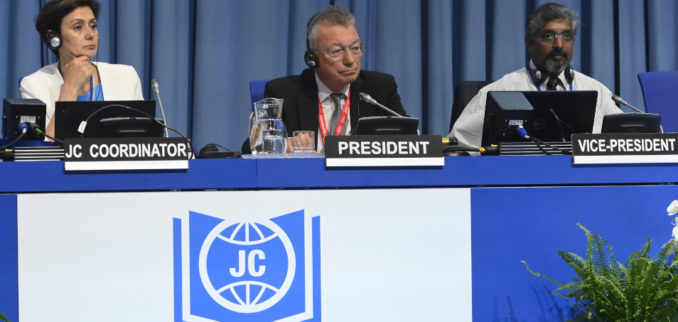Seventh Review Meeting of the Joint Convention: Switzerland Honours its Commitments
From 27 June to 8 July 2022, ENSI participated in the Seventh Review Meeting of the Joint Convention at the IAEA headquarters in Vienna. ENSI Director Marc Kenzelmann led the Swiss delegation, with Switzerland receiving top marks for its handling of spent fuel and radioactive waste.
“The Joint Convention offers a unique opportunity to exchange ideas and learn from each other at an international level,” stated ENSI Director General Marc Kenzelmann. He led the Swiss Delegation at the Seventh Joint Convention on the Safety of Spent Fuel Management and on the Safety of Radioactive Waste Management. The Review Meeting took place from 27 June to the 8 July 2022 at the International Atomic Energy Agency (IAEA) in Vienna under Swiss presidency.
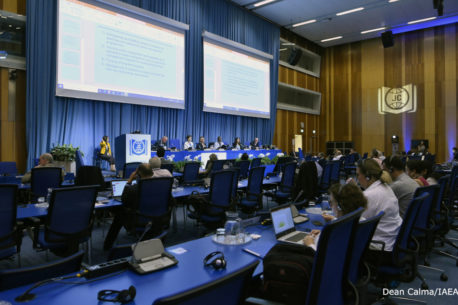
Since 2001, this international convention, the Joint Convention, has specified how the contracting parties are to manage spent fuel and radioactive waste. Every three years, the members submit a National Report. As part of the review conference, the contracting parties discuss and evaluate the National Reports and assess to what extent the obligations of the Joint Convention have been met. Switzerland was one of the first members of the Convention.
Switzerland acts in the sense of the Joint Convention
At the Review Meeting, Switzerland presented its National Report and answered questions about the status and progress of radioactive waste disposal. Switzerland received positive ratings in the following areas (“Areas of Good Performance”):
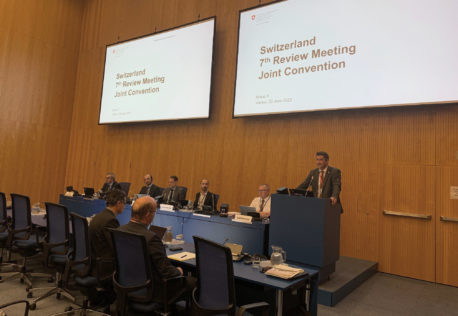
- Conclusion of stage 2 of the sectoral plan process and the comprehensive earth science studies for potential locations for deep geological repositories
- Early and comprehensive involvement of the public, even beyond national borders, in the process of selecting the location for deep geological repositories
- The annual collection campaign for MIF waste (radioactive waste from uses of radioactive substances in medicine, industry and research)
- Upgrading the spent fuel pond at the Mühleberg Nuclear Power Plant, in order to improve the cooling system’s resistance and to simplify decommissioning work.
Further steps in the sectoral planning process for geological deep repositories have been classified as a challenge for Switzerland.
The contracting parties concluded that Switzerland fulfilled the obligations of the Joint Convention on the Safety of Spent Fuel Management and on the Safety of Radioactive Waste Management.
Review Meeting under Swiss Presidency
Hans Wanner, former ENSI Director General, presided over the Seventh Review Meeting. On the first day of the conference, he reminded delegates that the contracting parties were present to conduct an effective, rigorous and transparent peer review for the further strengthening of nuclear safety on a worldwide basis. More than 750 delegates from 76 countries took part in the event.
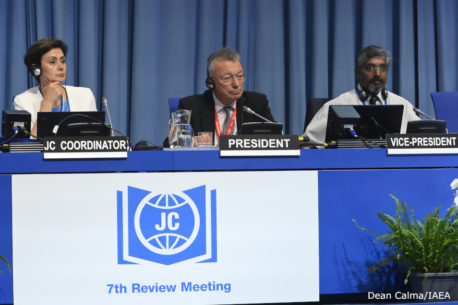
The Review Meeting was preceded by the Fourth Extraordinary Meeting. From 4 to 6 May 2022, proposals aimed at improving the mechanisms for mutual review and consequently also at further improving nuclear safety in the area of radioactive waste disposal and disposal of spent fuel in the contracting states were discussed. Six of the proposals, which had not yet been agreed in May, were brought forward again at the review meeting. Five of the proposals were approved by the contracting states.
The last review meeting took place in 2018. The Seventh Review Meeting was originally planned for 2021, however, due to the COVID-19 pandemic, it was delayed until 27 June to 8 July 2022.
What exactly is the Joint Convention?
The Joint Convention is the “Joint Convention on the Safety of Spent Fuel Management and on the Safety of Radioactive Waste Management”. The aim of this international convention is to achieve and maintain, in the contracting states, a high level of nuclear safety in the handling and storage of spent fuel and radioactive waste.
Switzerland signed the Joint Convention in 1997 and ratified it in 1999. Every three years, the contracting parties compile a National Report which is reviewed by other contracting parties at a review conference.
The Joint Convention came into force in 2001 and is the first legally binding instrument in the field of radioactive waste disposal and spent fuel.


